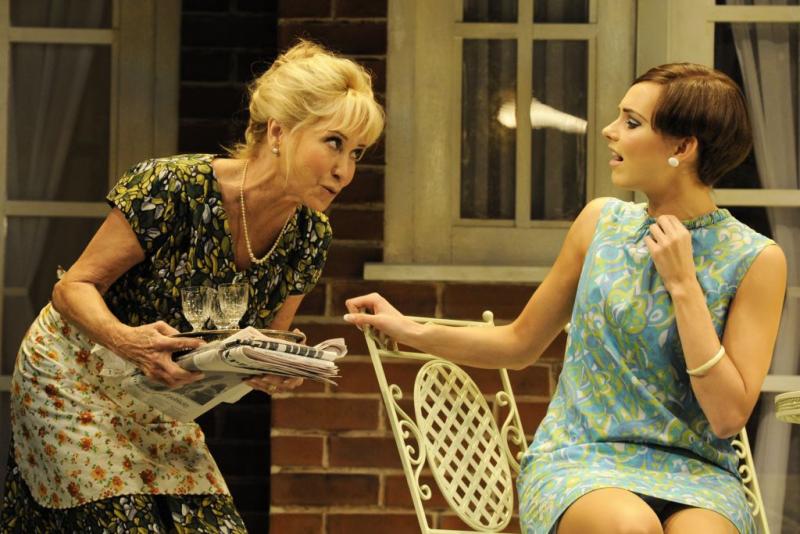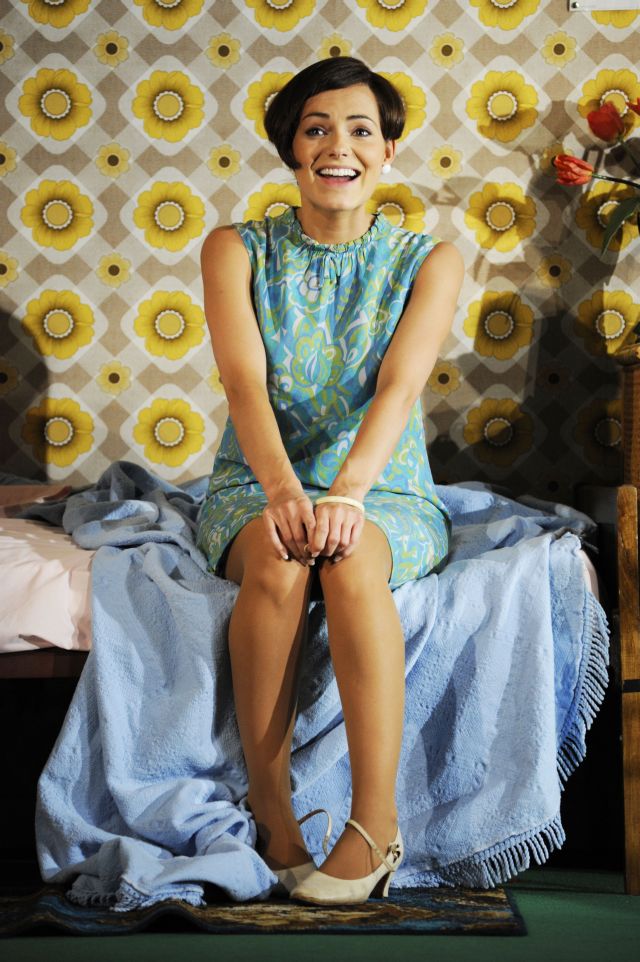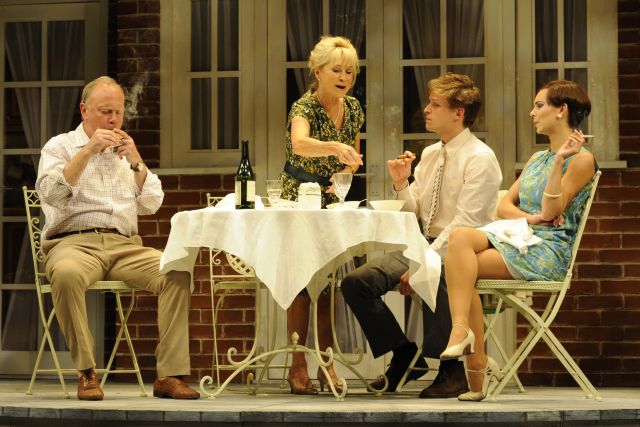Relatively Speaking, Wyndham's Theatre | reviews, news & interviews
Relatively Speaking, Wyndham's Theatre
Relatively Speaking, Wyndham's Theatre
Early Ayckbourn play fizzes anew 46 years on

The pronouns have it in Alan Ayckbourn's career-defining comedy of spiralling misunderstandings, which has arrived on the West End 46 years after first hinting at the formidable talent of a dramatist who could make of many an "it" and "she" a robustly funny study in two couples in varying degrees of crisis.
 A portrait of two partnerships - one but a month old though already on the road to marriage, the other well-established and near the point of ruin - Relatively Speaking takes an apparently simple conceit and pushes it to a perilously funny extreme. The loved-up Greg (a sweetly oblivious Max Bennett) decides to pay a surprise visit on the parents of the bewilderingly evasive girlfriend, Ginny (Kara Tointon, pictured above, her look to the Mary Quant manner born), whom he hopes to marry. Instead, a well-intentioned train journey to deepest Buckinghamshire lands Greg in the garden of a long-married couple who haven't the faintest idea who he is and won't until many a slow burn and double take have come to pass. And some while after "daddy" has acquired various meanings well beyond the merely paternal.
A portrait of two partnerships - one but a month old though already on the road to marriage, the other well-established and near the point of ruin - Relatively Speaking takes an apparently simple conceit and pushes it to a perilously funny extreme. The loved-up Greg (a sweetly oblivious Max Bennett) decides to pay a surprise visit on the parents of the bewilderingly evasive girlfriend, Ginny (Kara Tointon, pictured above, her look to the Mary Quant manner born), whom he hopes to marry. Instead, a well-intentioned train journey to deepest Buckinghamshire lands Greg in the garden of a long-married couple who haven't the faintest idea who he is and won't until many a slow burn and double take have come to pass. And some while after "daddy" has acquired various meanings well beyond the merely paternal.
Husband Philip (Jonathan Coy, splendidly splenetic) knows Ginny all right, not as a daughter but as his ongoing mistress in an affair that the young newlywed-in-waiting wants to bring to an end. Ginny's plans, in turn, fail to account for Philip's beamingly ditzy wife, Sheila (Kendal), who is erroneously taken to be the randy Greg's intended, thereby fulfilling Philip's deepest suspicions about his chipper if possibly none-too-faithful spouse. "I've mislaid the hoe," snarls Philip in a cascading fury at events that find errant garden implements to be the least of his worries. Ginny arrives in time for Tointon to further furrow her brow, the actress as voluble here as she was (deliberately) sullen and indrawn a season or two ago in the same dramatist's Absent Friends.
 A short play (less than two hours, interval included) is a marvel of construction that effortlessly folds the pressure of symmetrical train journeys into a city-vs-country gavotte that nods glancingly to Wilde while anticipating the far darker forays into the partnered psyche that would go on to be Ayckbourn's proven terrain. What enchants as well on this occasion is the period modishness of Peter McKintosh's poster-perfect design - Breakfast at Tiffany's on the lovers' London wall, the lunch from comic hell on the suburban menu - set against our burgeoning sense of Sheila as possibly the most astute figure on a greenery-bedecked stage on which Kendal is forever bustling about, proffering refreshment as the realisations come home to roost (the four actors are pictured above.)
A short play (less than two hours, interval included) is a marvel of construction that effortlessly folds the pressure of symmetrical train journeys into a city-vs-country gavotte that nods glancingly to Wilde while anticipating the far darker forays into the partnered psyche that would go on to be Ayckbourn's proven terrain. What enchants as well on this occasion is the period modishness of Peter McKintosh's poster-perfect design - Breakfast at Tiffany's on the lovers' London wall, the lunch from comic hell on the suburban menu - set against our burgeoning sense of Sheila as possibly the most astute figure on a greenery-bedecked stage on which Kendal is forever bustling about, proffering refreshment as the realisations come home to roost (the four actors are pictured above.)
Looking over her shoulder as if expecting some better, more truthful existence to make itself known, Kendal hasn't been this well cast in ages, her signature winsomeness replaced by a deliciously dim aspect that is itself shown to be far from the whole truth. And what will happen in the sequel to events that Ayckbourn didn't write? For all the chatter about the summer sun, one senses storm clouds brewing. This is Ayckbourn territory, after all, which means that happiness is only relative. Give these people and their playwright time, and make way in due course for madness.
rating
Explore topics
Share this article
The future of Arts Journalism
You can stop theartsdesk.com closing!
We urgently need financing to survive. Our fundraising drive has thus far raised £49,000 but we need to reach £100,000 or we will be forced to close. Please contribute here: https://gofund.me/c3f6033d
And if you can forward this information to anyone who might assist, we’d be grateful.

Subscribe to theartsdesk.com
Thank you for continuing to read our work on theartsdesk.com. For unlimited access to every article in its entirety, including our archive of more than 15,000 pieces, we're asking for £5 per month or £40 per year. We feel it's a very good deal, and hope you do too.
To take a subscription now simply click here.
And if you're looking for that extra gift for a friend or family member, why not treat them to a theartsdesk.com gift subscription?
more Theatre
 Mary Page Marlowe, Old Vic review - a starry portrait of a splintered life
Tracy Letts's Off Broadway play makes a shimmeringly powerful London debut
Mary Page Marlowe, Old Vic review - a starry portrait of a splintered life
Tracy Letts's Off Broadway play makes a shimmeringly powerful London debut
 Little Brother, Soho Theatre review - light, bright but emotionally true
This Verity Bargate Award-winning dramedy is entertaining as well as thought provoking
Little Brother, Soho Theatre review - light, bright but emotionally true
This Verity Bargate Award-winning dramedy is entertaining as well as thought provoking
 The Unbelievers, Royal Court Theatre - grimly compelling, powerfully performed
Nick Payne's new play is amongst his best
The Unbelievers, Royal Court Theatre - grimly compelling, powerfully performed
Nick Payne's new play is amongst his best
 The Maids, Donmar Warehouse review - vibrant cast lost in a spectacular-looking fever dream
Kip Williams revises Genet, with little gained in the update except eye-popping visuals
The Maids, Donmar Warehouse review - vibrant cast lost in a spectacular-looking fever dream
Kip Williams revises Genet, with little gained in the update except eye-popping visuals
 Ragdoll, Jermyn Street Theatre review - compelling and emotionally truthful
Katherine Moar returns with a Patty Hearst-inspired follow up to her debut hit 'Farm Hall'
Ragdoll, Jermyn Street Theatre review - compelling and emotionally truthful
Katherine Moar returns with a Patty Hearst-inspired follow up to her debut hit 'Farm Hall'
 Troilus and Cressida, Globe Theatre review - a 'problem play' with added problems
Raucous and carnivalesque, but also ugly and incomprehensible
Troilus and Cressida, Globe Theatre review - a 'problem play' with added problems
Raucous and carnivalesque, but also ugly and incomprehensible
 Clarkston, Trafalgar Theatre review - two lads on a road to nowhere
Netflix star, Joe Locke, is the selling point of a production that needs one
Clarkston, Trafalgar Theatre review - two lads on a road to nowhere
Netflix star, Joe Locke, is the selling point of a production that needs one
 Ghost Stories, Peacock Theatre review - spirited staging but short on scares
Impressive spectacle saves an ageing show in an unsuitable venue
Ghost Stories, Peacock Theatre review - spirited staging but short on scares
Impressive spectacle saves an ageing show in an unsuitable venue
 Hamlet, National Theatre review - turning tragedy to comedy is no joke
Hiran Abeyeskera’s childlike prince falls flat in a mixed production
Hamlet, National Theatre review - turning tragedy to comedy is no joke
Hiran Abeyeskera’s childlike prince falls flat in a mixed production
 Rohtko, Barbican review - postmodern meditation on fake and authentic art is less than the sum of its parts
Łukasz Twarkowski's production dazzles without illuminating
Rohtko, Barbican review - postmodern meditation on fake and authentic art is less than the sum of its parts
Łukasz Twarkowski's production dazzles without illuminating
 Lee, Park Theatre review - Lee Krasner looks back on her life as an artist
Informative and interesting, the play's format limits its potential
Lee, Park Theatre review - Lee Krasner looks back on her life as an artist
Informative and interesting, the play's format limits its potential
 Measure for Measure, RSC, Stratford review - 'problem play' has no problem with relevance
Shakespeare, in this adaptation, is at his most perceptive
Measure for Measure, RSC, Stratford review - 'problem play' has no problem with relevance
Shakespeare, in this adaptation, is at his most perceptive

Add comment